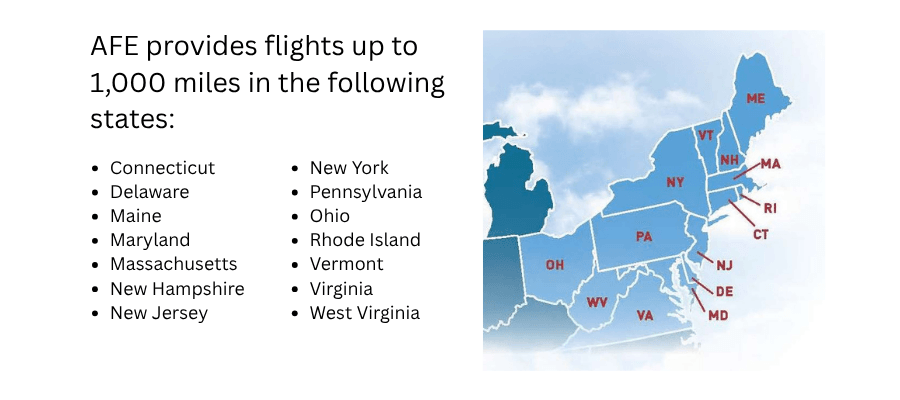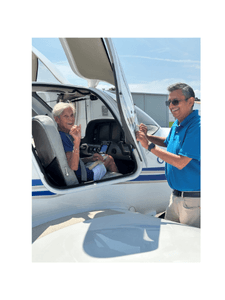How your flight will be arranged
Once your application and paperwork are approved, Angel Flight East will begin finding a volunteer pilot for your trip. When a pilot accepts, they’ll contact you directly to coordinate all travel details—typically at least 24 hours before your flight. If a pilot cannot be secured, AFE will notify you one business day before your scheduled departure (or earlier if requested).
Service Area

Example of boarding a small plane
TRAVEL TIPS
Have a backup plan
Pilots make the final decisions about the execution of their flights. A pilot may delay or cancel due to weather or other critical factors. In rare cases, a volunteer for your flight may not be available. For these reasons, we ask our passengers to have a backup plan or be able to reschedule their appointments.
Talk to Your Pilot
Your pilot is the expert, and you are a guest on their aircraft, so please respect their rules and guidance. Talk with your pilot about the conditions you can expect on your flight, what's appropriate to bring aboard, and any potential safety concerns ahead of time.
Be aware that, for safety reasons, some pilots request no talking during takeoff and landing, or throughout the flight. Your pilot will inform you of his or her specific requirements.
Think small and pack light!
The total weight limit for all bags carried aboard is 40 lbs. This includes all luggage, purses, and any other items carried aboard. Luggage should be packed in a small, soft-sided duffel bag or gym bag. One small bag per person is appropriate. Medical equipment, car seats, strollers, and other items can often be accommodated with 24-hour notice.
Small Aircraft
Flying in a small aircraft is a unique experience! These planes typically seat four to six people and fly at lower speeds and altitudes than commercial jets, so travel time may be a bit longer—but the view is much better. Below is a typical aircraft:

What to Expect When Flying
Boarding the Plane
You may need to step up onto a wing 16–20 inches high, crouch through a small door, and lower yourself into the seat. Passengers must be able to do this independently to fly.
Noise
Small planes are louder than commercial jets. Your pilot will provide headsets for communication, but earplugs can help reduce noise further. Engine sounds may vary during flight—this is normal.
Turbulence
Expect more bumps than on larger aircraft. These are common and not a cause for concern.
Temperature
Many small planes lack heating or air conditioning. It can be cooler at higher altitudes or warm on sunny days. Ask your pilot how to dress comfortably.
No Restrooms or Food Service
AFE flights do not have restrooms or meal service. Check with your pilot before bringing food aboard.
Traveling with Children
During takeoff and landing, a bottle, pacifier, or gum helps relieve ear pressure. Children under 2 must travel in an FAA-approved safety seat.
Ground Transportation
Ground transportation via Lyft between the airport and the hospital may be available upon request.



